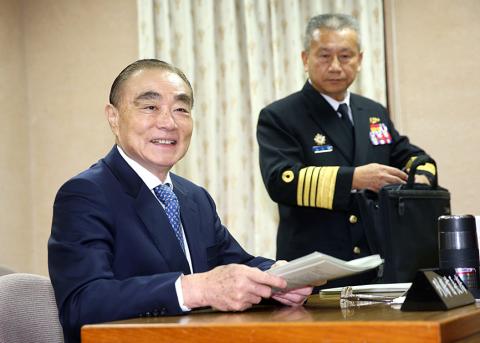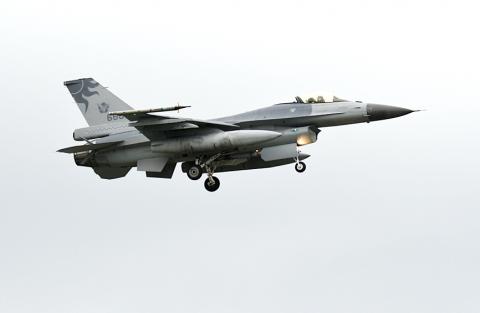The military yesterday carried out a nationwide air defense exercise to test its air warfare capabilities and military response time, following two training missions conducted by the Chinese air force involving aircraft circling Taiwanese airspace.
The routine exercise, code-named Lien Hsiang (聯翔), was held from 6am to 8am.
The navy deployed destroyers and frigates and the army mobilized missile defense units to conduct a joint anti-aircraft drill, while the air force sent up F-16 jets to act as an opposing force to test the air defense capabilities of the armed forces, media reports said.

Photo: CNA
Two F-16s based in Hualien, reportedly fitted with two fuel tanks to increase flight duration and range, were scrambled to conduct intercept training.
However, the Ministry of National Defense refused to comment on the reported operations or reveal what troops and weapons were deployed in the drill, saying only that different branches of the armed forces across the nation were activated.
The exercise had long been planned for yesterday as part of the military’s annual training schedule, and the operation was not related to recent Chinese military activities around Taiwanese airspace, Minister of National Defense Feng Shih-kuan (馮世寬) said during a budget review at a meeting of the legislature’s Foreign and National Defense Committee.

Photo: Yu Tai-lang, Taipei Times
“The exercise is held once every season. The timing is purely coincidental and the drills do not have a specific target,” he said.
Chinese military aircraft flew over the Miyako Strait near Japan’s Okinawa Prefecture and circled outside Taiwan’s air defense identification zone twice in the past three weeks.
“The exercise was designed to familiarize the troops with combat skills. It was also aimed at reassuring the public that the military is combat ready and that fighter jets are engaged in ongoing exercises throughout the year,” he said.
Ministry spokesman Major General Chen Chung-chi (陳中吉) said the seasonal exercise was planned months earlier and China showed no apparent reaction to the routine exercise.
Chen said the Executive Yuan has measures in place to tap a reserve fund for military purposes in response to a remark by US Deputy Assistant Secretary of Defense for East Asia Abraham Denmark that Taiwan’s defense budget is disproportionate to the military threat the nation is facing.
Meanwhile, Coast Guard Administration Director-General Lee Chung-wei (李仲威) said it is “possible” that Chinese navy ships might cruise around Taiwan’s maritime zones following the two training missions by the Chinese air force.
In the event of Chinese naval vessels entering waters within 12 nautical miles (22km) of Taiwan’s maritime territory, the agency would ensure public security in this area, and if a hostile situation arises, relevant mission adjustments would be made, Lee said during a budget review at a meeting of the the legislature’s Internal Administration Committee.
In a wartime scenario, the coast guard would be under the command of the defense ministry and would undertake missions under its direction, Lee said.

NATIONAL SECURITY THREAT: An official said that Guan Guan’s comments had gone beyond the threshold of free speech, as she advocated for the destruction of the ROC China-born media influencer Guan Guan’s (關關) residency permit has been revoked for repeatedly posting pro-China content that threatens national security, the National Immigration Agency said yesterday. Guan Guan has said many controversial things in her videos posted to Douyin (抖音), including “the red flag will soon be painted all over Taiwan” and “Taiwan is an inseparable part of China,” while expressing hope for expedited “reunification.” The agency received multiple reports alleging that Guan Guan had advocated for armed reunification last year. After investigating, the agency last month issued a notice requiring her to appear and account for her actions. Guan Guan appeared as required,

Japan and the Philippines yesterday signed a defense pact that would allow the tax-free provision of ammunition, fuel, food and other necessities when their forces stage joint training to boost deterrence against China’s growing aggression in the region and to bolster their preparation for natural disasters. Japan has faced increasing political, trade and security tensions with China, which was angered by Japanese Prime Minister Sanae Takaichi’s remark that a Chinese attack on Taiwan would be a survival-threatening situation for Japan, triggering a military response. Japan and the Philippines have also had separate territorial conflicts with Beijing in the East and South China

A strong cold air mass is expected to arrive tonight, bringing a change in weather and a drop in temperature, the Central Weather Administration (CWA) said. The coldest time would be early on Thursday morning, with temperatures in some areas dipping as low as 8°C, it said. Daytime highs yesterday were 22°C to 24°C in northern and eastern Taiwan, and about 25°C to 28°C in the central and southern regions, it said. However, nighttime lows would dip to about 15°C to 16°C in central and northern Taiwan as well as the northeast, and 17°C to 19°C elsewhere, it said. Tropical Storm Nokaen, currently

PAPERS, PLEASE: The gang exploited the high value of the passports, selling them at inflated prices to Chinese buyers, who would treat them as ‘invisibility cloaks’ The Yilan District Court has handed four members of a syndicate prison terms ranging from one year and two months to two years and two months for their involvement in a scheme to purchase Taiwanese passports and resell them abroad at a massive markup. A Chinese human smuggling syndicate purchased Taiwanese passports through local criminal networks, exploiting the passports’ visa-free travel privileges to turn a profit of more than 20 times the original price, the court said. Such criminal organizations enable people to impersonate Taiwanese when entering and exiting Taiwan and other countries, undermining social order and the credibility of the nation’s